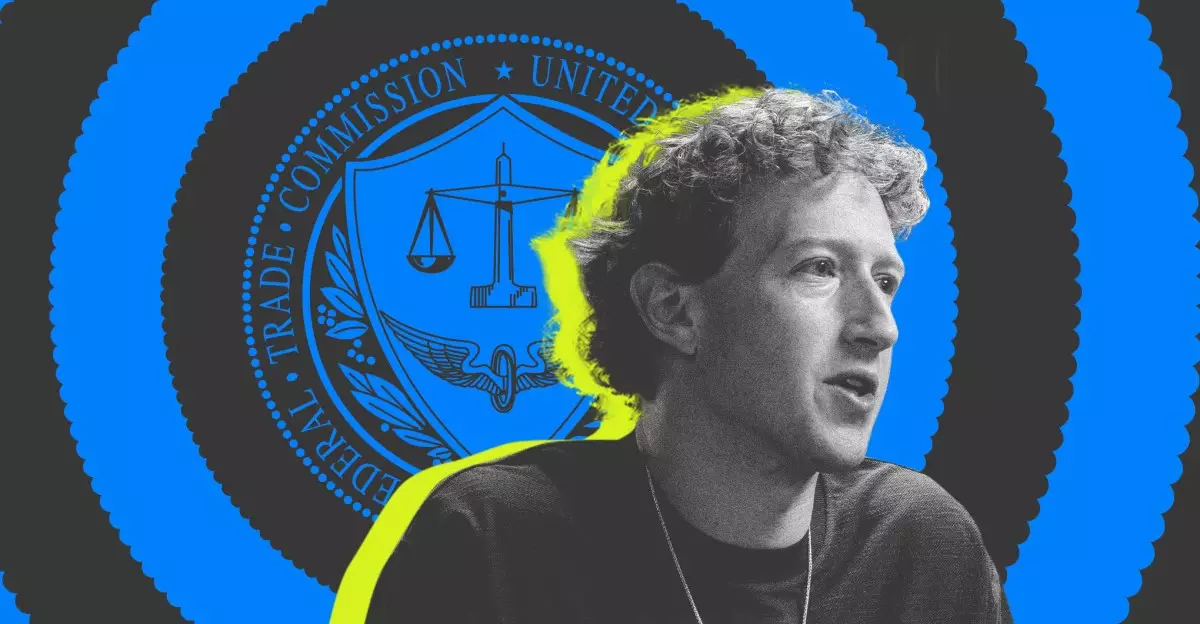In recent courtroom testimonies, Mark Zuckerberg, the co-founder and CEO of Meta Platforms Inc., revealed insights about the pivotal decisions he made that have shaped the current landscape of social media. The context of these discussions is a prominent antitrust trial initiated by the Federal Trade Commission (FTC) aimed at scrutinizing Meta’s aggressive acquisition strategies—namely, its purchase of Instagram and WhatsApp—during a time when these platforms had the potential to become strong rivals. This trial raises pertinent questions about whether Meta’s strategies reinforced its dominance or stifled competition.
Zuckerberg faced challenging inquiries regarding his vision and rationale behind acquiring emerging competitors. He appeared particularly measured, categorically highlighting the “fluid” nature of the market. While the FTC is pushing its narrative of Meta monopolizing social media by absorbing potential threats, Zuckerberg counters this by mixing humility with assertiveness, positioning TikTok, YouTube, and iMessage as formidable competitors. This framing reflects not just a defensive stance but also a recognition that the digital space is evolving rapidly, and adaptability is key to survival.
The Road Not Taken: Speculative Strategies
Meta’s journey could have ventured down vastly different paths, as indicated through discussions and documents presented in the courtroom. One standout alternative involves Zuckerberg’s overtures toward acquiring Snapchat for $6 billion in 2013, an offer that was turned down by Snapchat’s CEO Evan Spiegel. It’s intriguing to speculate how the social media landscape would appear today had that acquisition been consummated. Would Snapchat have flourished under Meta’s wing, transforming into a dominant player’s arsenal against competitors? Or would it have ultimately suffered from the same fate as other acquisitions, with its unique features diluted within the wider Meta ecosystem?
Zuckerberg revealed more than just hypothetical paths; he candidly admitted to contemplating drastic measures like wiping users’ friends lists to rejuvenate the Facebook user experience. Such radical moves suggest a desperation to reignite the platform’s initial charm—a recognition that the very essence of the service may be at risk of stagnation. This introspection not only humanizes the tech titan but underscores the challenges inherent in maintaining relevance in an ever-evolving digital marketplace.
The Complexity of Market Definitions
A significant layer of controversy in the trial represents the intricate definitions of the “market” itself. The FTC alleges that Meta curtails competition through its monopolistic strategies while using its own marketing narratives to position itself distinctly. Zuckerberg’s testimony highlighted a nuanced view: he argued that the social media landscape encompasses numerous overlapping services, disputing the FTC’s narrow market characterization. This commentary not only illustrates the pitfalls inherent in regulatory definitions but also unveils the complexities that companies navigate when balancing competitive practices with innovative aspirations.
There are numerous facets to Zuckerberg’s assertion that competition is fluid. The advent of platforms like TikTok has redefined user engagement and dynamics. If Meta is perceived to be the market’s titan, the trials and tribulations it faces underscore that being a digital giant does not equate to being insulated from competition. Meanwhile, apps like Snapchat and even professional networking services like LinkedIn offer services that intersect with social networking, blurring the lines even further.
The Dichotomy of Innovation and Control
An undercurrent throughout the trial is the tension between innovation and control. The FTC’s argument hinges on the premise that Meta’s acquisitions choke off innovative competition. Yet, Zuckerberg positions his acquisitions as a means of bolstering innovation within the platforms. He emphasizes that Instagram and WhatsApp have thrived under Meta’s stewardship, evolving from nascent platforms into vital communication tools. This perspective accentuates the dual-edged sword of corporate acquisitions: they can either foster creativity and growth or inhibit competition.
Zuckerberg’s potential strategy of introducing a feed primarily composed of advertisements sheds light on another crucial dynamic—the monetization of user engagement. He asserted that users often perceive these ads as beneficial content, which raises ethical questions about how user experience is commodified. If consumers do not discern a clear difference between organic and paid content, have we crossed a threshold where basic assumptions about social media integrity are challenged?
The courtroom discussions reveal a fascinating balance between strategic maneuvering and regulatory oversight. Meta’s battle against the FTC epitomizes a larger conflict concerning the role of technology companies in society and the extent to which regulatory frameworks can effectively govern rapid innovations.
Through Zuckerberg’s introspective revelations, it becomes apparent that Meta’s journey is not merely about creating social media but also managing a complex interplay of competition, innovation, and ethical engagement within a highly volatile market landscape. The unfolding antitrust case is just one chapter in a rich narrative of technological evolution that promises to reflect the ongoing trials of our digital age.


Leave a Reply